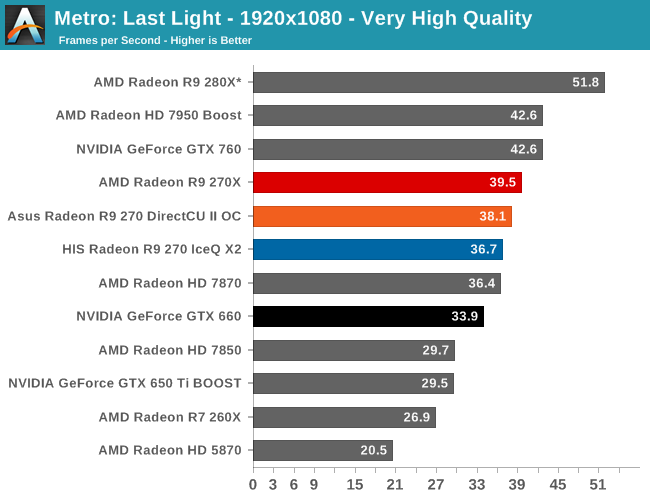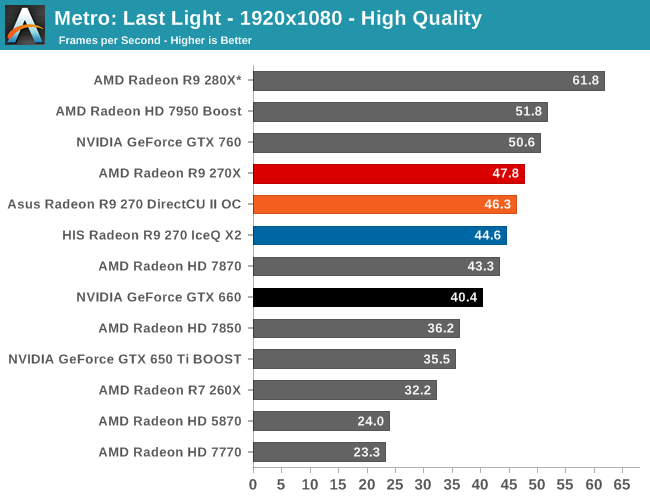The AMD Radeon R9 270X & R9 270 Review: Feat. Asus & HIS
by Ryan Smith on November 13, 2013 12:01 AM ESTMetro: Last Light
As always, kicking off our look at performance is 4A Games’ latest entry in their Metro series of subterranean shooters, Metro: Last Light. The original Metro: 2033 was a graphically punishing game for its time and Metro: Last Light is in its own right too. On the other hand it scales well with resolution and quality settings, so it’s still playable on lower end hardware.


AMD likes to pitch the 270 series as their primary 1080p cards, and although they generally do a perfectly fine job at it, Metro is a reminder that there are scenarios where they will come up short, particularly if trying to do 1080p at the highest quality settings. For these cards if we want framerates better than the 30s, we have to look at moving down a quality level.
At 1080p high quality, we can get our 270 cards up to the mid-40fps range. 270X of course leads the pack, but the 270 cards are very close behind owing to the fact that the only difference between the cards is the GPU clockspeed.
For the 270X in particular we’re looking at performance just a few frames per second behind the more expensive GTX 760, for a deficit of 6%. Otherwise the only cards close to it are of course the 270, and the outgoing 7870.
As for our 270 cards, they are second only to the 270X in anything near their price. The Asus card with its factory overclock is as to be expected faster, essentially splitting the difference between the stock clocked HIS 270 and the 270X. Furthermore in this test both cards are faster than the 7870 – a Pitcairn card with higher clockspeeds – showing the potency of the memory clockspeed increase. Finally, both cards are 10%+ faster than the GTX 660, making this an easy win for AMD.










59 Comments
View All Comments
Ryan Smith - Wednesday, November 13, 2013 - link
Non-reference. There isn't a reference 280X, so we're using an XFX card as a proxy.garadante - Wednesday, November 13, 2013 - link
Ah, alright. And I also noticed that there's no overclocking section on this review, which is one of the most important aspects of any GPU review for me personally. Is there a specific reason for that?Erenhardt - Wednesday, November 13, 2013 - link
AMD cards cant be overclocked within "out of the box" policy. Contrary to nvidia cards, which overclocks nicely giving free performance for every CUDA user.garadante - Wednesday, November 13, 2013 - link
I don't know what you're smoking Erenhardt, because AMD cards overclock quite nicely. In fact, overclocking AMD cards is currently much more user open because they can be overvolted, whereas Nvidia has locked down on user overvolting. And I have no clue what "out of the box" policy you're trying to mention. Overclocking an AMD card won't void the warranty unless there's damage to the card itself. Please don't try to troll.ddriver - Wednesday, November 13, 2013 - link
Too bad most nvidia gpus suck in compute...Ryan Smith - Wednesday, November 13, 2013 - link
Solely a matter of timing. I have the data, but this launch happened opposite APU13. So it had to be written very quickly.The 270X topped out at 1150MHz Base (1200MHz boost) and 6.5GHz memory. The HIS 270 topped out at 1075MHz base (1100MHz boost) and 6GHz memory. The Asus topped out at 1125MHz (1150MHz boost) and 6GHz memory.
garadante - Wednesday, November 13, 2013 - link
Ah, alright. Thanks Ryan! So unless it's a fluke, the 270X might be slightly better binned than the 270. Are the default BIOS still not allowing for overvolting like most of the 290 series? Or because these are refreshes, is overvolting already possible with current tools without updates?blanarahul - Wednesday, November 13, 2013 - link
How can the GTX 760 beat the R9 280X in Hitman: Absolution?!The Von Matrices - Wednesday, November 13, 2013 - link
It was said in previous articles (but it should be included in all articles that have the 280X in the chart) that there is no reference 280X card or heat sink so the results they are using are from an XFX card with custom PCB and cooling (but stock clock speeds).laskdfjoiewjfalsd - Wednesday, November 13, 2013 - link
For the love of God post the Nexus 5 review already. I come here everyday and see random stuff like this while a flagship is being put off to the side!